Are traditional MBAs becoming obsolete? More professionals are pivoting away from these expansive degrees in favor of alternative learning models that promise real-world skills, hands-on experience, and a fraction of the cost.
In today's rapidly changing job market, flexibility and practical skills are king, making these unconventional paths more relevant and transformative than traditional classroom settings.
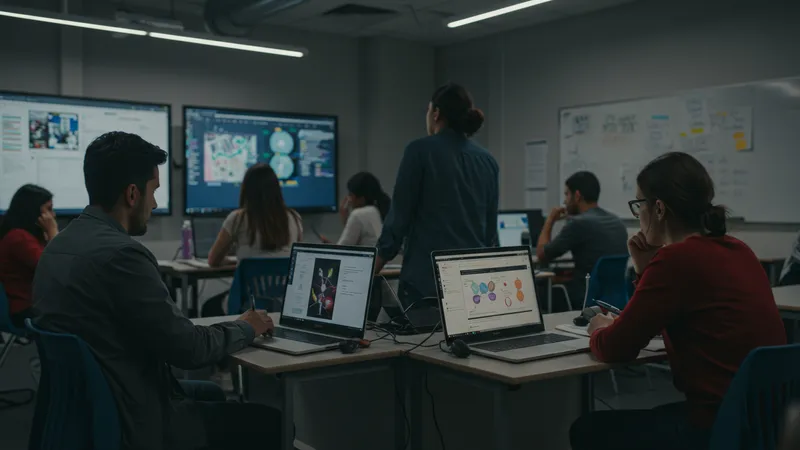
Consider this: 80% of surveyed employers now value skills demonstrations over formal education. It's no longer just about having a degree but acquiring competencies that can be applied directly to the job. For instance, the majority of Silicon Valley companies reportedly hire professionals from non-traditional backgrounds, focusing instead on their ability to solve real problems. But that’s not even the wildest part…
Some of the world’s most successful entrepreneurs never set foot in an MBA class. Instead, they've navigated the chaotic seas of business through online courses, mentorships, and real-world experiences that armed them with the tools to innovate and disrupt. Could these alternatives truly hold the key to personal and professional success? What happens next shocked even the experts…
It's no secret that traditional MBAs have long been associated with prestige, expansive networks, and promising job prospects. However, in recent years, the landscape has dramatically shifted. Rising tuition costs, which often escalate to over $100,000, are leaving graduates with insurmountable debt, without the corresponding job growth and salary boosts. Recent studies highlight a troubling trend: MBA grads are increasingly struggling to secure jobs, especially within startups that now prioritize nimble, innovative thinking over textbook strategies.

But beyond the staggering financial commitment, the time investment also hampers career progression. With programs spanning two years or more, many professionals find themselves sidelined from their careers during critical growth phases. This pause from practical experience can deter employers who seek candidates that can hit the ground running. What you read next might change how you see this forever.
Moreover, the curriculum of these programs often lacks the agility to keep up with evolving 21st-century business needs. While case studies from decades past are fascinating, they don't always equip students with actionable insights required in today's tech-driven world. Industries are becoming more niche and require specific skills sets that traditional education fails to provide. But there’s one more twist…
A startup culture celebrating entrepreneurship and innovation continues to evolve outside of academic walls. This culture fosters a spirit of learning by doing, making strategic failures and rapid pivots part of the education process. With this hands-on approach, real-world problems become the classroom, and the market becomes the ultimate examination room. The next page unveils uncommon alternatives that are shaking up the B-school scene entirely.
Bootcamps have emerged as a fast-track ticket to pertinent skills, offering concentrated learning experiences without the fluff. Unlike traditional programs, bootcamps like The Iron Yard and its ilk forego abstract concepts, diving directly into applicable skills within a matter of months. Costs are significantly lower, often resembling the price of a car rather than a mortgage. These rigorous sessions, typically lasting between six to twelve weeks, are designed to equip participants with the ability to construct and implement real solutions afforded by fast-evolving industries.
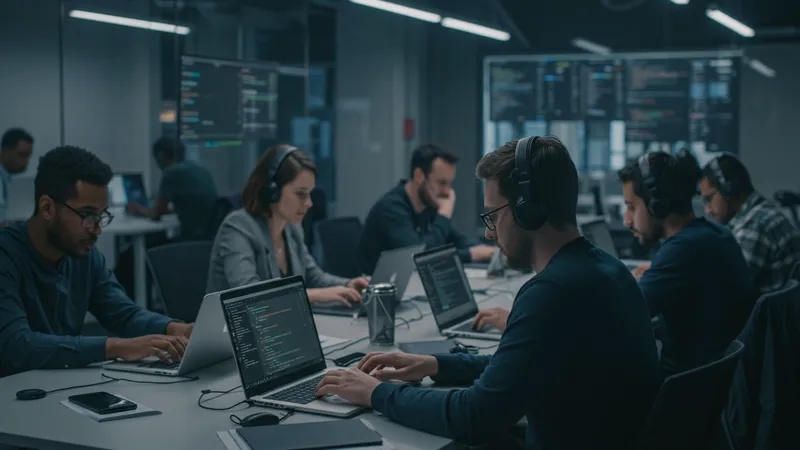
This is why tech giants like Google and Facebook are piloting in-house education initiatives that mirror bootcamp methodologies. They recognize the value in employees who can adapt quickly, learn on the fly, and bring something concrete to the table immediately. An eye-opening stat reveals that candidates who complete coding bootcamps increase their salaries by an average of 50%. But while tech fields lead the bootcamp revolution, other industries are catching on too.
Beyond tech, sectors such as marketing, data science, and finance are investing in bootcamp-styled education to meet their specialized skill demands. The intensive learning process, combined with a community-driven environment, replicates real-world scenarios more authentically than reading from a slide in a lecture hall. By focusing on in-demand skills, bootcamps are crafting graduates who hit the ground running. What about a hybrid model? There’s still a surprising blend to explore.
As the bootcamp interest heats up, educational platforms are beginning to offer hybrid programs—merging career-specific bootcamps with foundational MBA-level instruction. This innovative model seeks to marry the practicality of hands-on training with the strategic mindset fostered through classical education. What does this mean for the future of business learning? The following revelations are game changers.
For those looking to bypass conventional classrooms altogether, the resurgence of mentorship stands as a compelling alternative. Unlike the one-size-fits-all approach of many MBAs, personalized mentoring provides tailored guidance that aligns with individual career goals. Programs like SCORE, supported by the SBA, pair aspiring entrepreneurs with retired executives, delivering insights rooted in decades of experience.

Mentee success stories are illuminating: 70% of small businesses with ongoing mentorship survive beyond five years—double the success rate of their non-mentored peers. These impressive outcomes underscore the critical role of personalized advice and network leverage that only seasoned mentors can provide. There's more to this than meets the eye, however.
Beyond personal growth, mentorship fosters essential networking opportunities, organically growing connections that textbooks can't replicate. Aspiring leaders gain a foot in the door within industries they aim to dominate, fast-tracking their career trajectory. Yet the question remains: what if mentoring blended with conventional learning?
Some forward-thinking companies are now embedding mentorship as a pivotal component of their internal learning and development programs. Navigating the dynamic intersections of professional development venues could be the MBA of tomorrow. And this is just the beginning of what's possible—more twists await.
The advent of the internet did not just connect people globally; it revolutionized how we acquire knowledge. Online learning platforms such as Coursera and edX democratize education by offering courses from prestigious universities at a fraction of typical tuition fees. Stanford, MIT, even Harvard—these names now grace the virtual syllabi accessible to anyone with an internet connection (for as little as $50 per course!).
What's revolutionary about platforms like these is the breadth of content, ranging from basic introductions to deep-dives into niche subjects. Learners can tailor their education, picking and choosing elements that align closely with their career goals. Yet, there is more beneath the surface that might surprise even the most tech-savvy learners.
Unlike traditional programs, these platforms offer flexibility that allows students to maintain full-time careers while pursuing further education. This grants autonomy over learning, turning any coffee break into potential class time. Still, the effect on personal discipline is profound; those who engage with these platforms develop time management skills crucial in any role. However, that’s not the end of the educational transformation—there's an evolving landscape within online learning that demands attention.
As technology continues to evolve, so does education. Artificial intelligence is poised to enhance these platforms further, tailoring course recommendations, and even personalizing the learning paths of students. This evolution might just make traditional MBAs obsolete. What changes await as AI becomes the mastermind behind education? Read on to find out.
Artificial Intelligence and Blockchain technology are at the forefront of revolutionizing education, making the concept of lifelong learning more accessible and transparent. AI has already started personalizing learning experiences on platforms like Khan Academy, adapting courses to match the pace and style best suited for each learner. Such innovation ensures that skills development is individualized, supplementing where needed, and fast-tracking where possible.
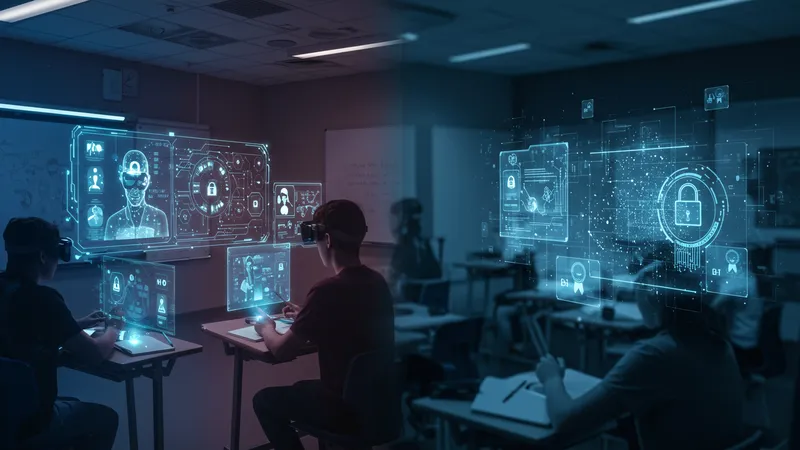
Blockchain, on the other hand, is working to solve the authenticity crisis. By encapsulating educational achievements on an immutable ledger, students gain verifiable credentials that employers can trust without question. But the impact of these technologies stretches far beyond digitizing transcripts.
As both AI and blockchain are harnessed further, they promise to upend traditional verification systems, offering a globally accepted standard in academic proofs that cannot be tampered with. This could dismantle the age-old skepticism employers hold against non-traditional educational backgrounds, bolstering confidence in alternative credentials. And here's where it gets even more enticing…
Industries are beginning to pilot these technologies, envisioning campuses where AI teaching assistants complement human educators, and certifications are secured on blockchain. The outcomes could spell a revolution that we are only just beginning to glimpse. The extent of this overhaul—and its ramifications on traditional education frameworks—is revealed next.
Jettison the belief that an MBA is a requisite for success. Some of the biggest names in business dared to defy the norms, charting their paths while sidestepping traditional academic constraints. Take Steve Jobs, who famously approached learning with curiosity over credentials, soaking up knowledge from the university classes he audited sans enrollment.
Similarly, Richard Branson built his Virgin empire without succumbing to the allure of MBA programs. His narrative underscores an alternative approach to learning—one that harnesses innate creativity and risk-taking, paired with on-the-job experience. But did they simply get lucky? Some striking revelations dispel this myth.
These stories reveal a common thread: unrelenting zest for learning and an ability to pivot on experiences rather than grades. A crucial piece of this puzzle lies in their unconventional learning networks, blending mentorship, real-world trials, and self-study fueled by personal passion. But let's dive deeper into how they outmaneuvered those with traditional educations.
The landscape of expertise is shifting. Innovators are quick to spot gaps that MBA programs frequently overlook: emotional intelligence, resilience, and a profound understanding of customer needs. With alternative education emphasizing these soft skills, are we witnessing the dawn of a new educational era? Ahead, we explore the tools turning this tide.
Alumni networks have long been touted as one of the key benefits of traditional MBA programs. These well-established webs of influence can offer introductions and encouragement, guiding fresh graduates through the labyrinth of corporate ladders. But what if similar networks could exist outside of the university frameworks, offering the same, if not greater, value?

Indeed, communities centered around alternative education paths are thriving, albeit less visibly. Conferences, online forums, and platforms like LinkedIn are becoming the new arenas where like-minded learners converge, formulating powerful networks that challenge the notion of alumni exclusivity. But what secrets do these networks harbor?
Untethered from institutional confines, alternative networks often have a broader reach, connecting individuals across industries, geographies, and career stages. This kaleidoscopic view furnishes learners with a variety of perspectives that enrich their understanding of global trends and market movements. So, what sets them apart from traditional alumni networks?
These communities foster authenticity, often arising from shared challenges and triumphs rather than obligatory alumni meet-ups. As they evolve, they become valuable incubators for innovative ideas, fostering collaborations that might never have formed within the rigid ranks of academic alumni. The next progression in their power is truly eye-opening.
In today’s interconnected world, geographical limits on education are rapidly disappearing, ushering in a paradigm shift known as global learning. This bold transition is exemplified by high-caliber platforms like FutureLearn and MasterClass, where instructors and students span continents, obliterating classroom walls and time zones alike.
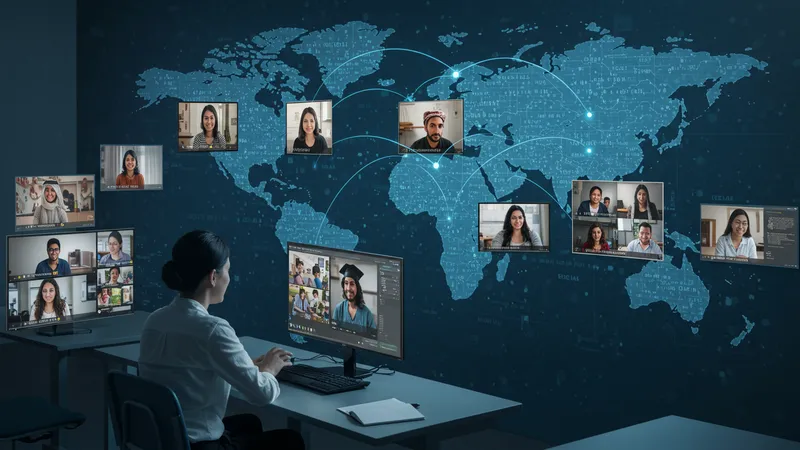
With courses escorted across borders, learners gain access to international perspectives often absent in traditional programs. This exposure enriches decision-making processes, enabling future leaders to understand cultural nuances and global market dynamics. These insights, once exclusively discussed in multi-national boardrooms, can now be embedded in everyday learning.
Moreover, global learning crafts an equity of opportunity, irrespective of one’s geographical location or socio-economic standing. This democratization provides a footing for talent where access to traditional institutions may have been an insurmountable hurdle. But how does this play out for students hailing from remote corners of the globe?
For many, this opportunity doesn’t just level the educational playing field but elevates it, positioning them uniquely as intermediaries between local and broad-based business strategies. The implications for enterprises in need of culturally agile talent are vast. The broadened horizons of global learning present endless possibilities, rewriting the future script of education.
In an age defined by digital advancements and relentless screen time, mindfulness is emerging as an invaluable addition to learning paradigms, encouraging deeper connections between students and materials. Today, courses that weave mindfulness into curricula enable learners to harness emotional regulation, focus, and creativity—skills often overshadowed by technical prowess.
Educational researchers are highlighting remarkable results: students rooted in mindfulness display improved problem-solving abilities and enhanced emotional intelligence. As attention spans dwindle in the digital deluge, mindfulness equips learners to navigate distractions and maintain sustained concentration. These benefits are only the tip of the iceberg.
Corporations are not blind to this shift, championing programs that integrate mindfulness within their training regimens. The blending of consciousness with cognitive skills has seen employee satisfaction, productivity, and innovation surge. Mindfulness, it seems, is not just a personal enhancement but a business advantage.
With this transformative tool at the forefront, the educational tide continues to shift. As more institutions introduce mindfulness alongside core subjects, a novel comprehension of holistic learning emerges. How will these shifts redefine the learning experience in the years to come? The story is just unfolding.
Standing at the crossroads of education, a veritable revolution looms—the future of lifelong learning. Unlike transient educational experiences, lifelong learning proposes an ongoing journey, continuously adapting to personal, cultural, and technological transformations. Educational innovators are responding to this call, crafting curricula designed to evolve alongside learner needs, effectively rendering outdated the finite pursuit of traditional degrees.

This adaptable learning model invites individuals to perpetually refine their expertise, relish in diverse disciplines, and remain agile within ever-changing markets. Undoubtedly, lifelong learning could become the hallmark of future educational systems, as traditional forms bow to their versatile successor.
Industry leaders are taking notice, establishing career development paths that accommodate this perpetual state of learning, fostering employees' intrinsic motivation as they climb their career ladder. The rise of micro-credentials and modular learning options is shaping pathways unbound by age or prior attainment, offering learners a future punctuated by possibilities.
Through this emerging paradigm, the role of educators transforms too, morphing from dispensers of knowledge to facilitators of exploration and curiosity. In this dawning era, the pursuit of knowledge becomes ceaseless, an anthem celebrating the perpetual student in us all. The question remains: how will traditional institutions respond to such transformative power?
As you stand on the precipice of decisions that will shape your educational journey, remember that the choice of path is yours to command. Traditional MBA routes offer a familiar, structured environment, but alternatives brim with nimbleness, innovation, and pathways uniquely tailored to diverse ambitions.
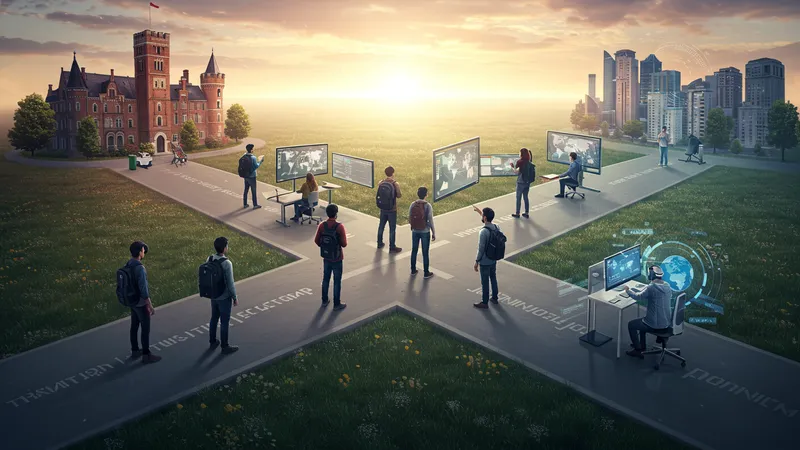
Consider the expedient options unfolding at your fingertips—bootcamps redefining skills, mentorships offering personalized guidance, global platforms enriching perspectives, and all the digital savvy that alternative learning promises. Contemplate the broader horizons they unveil—career reinvention, entrepreneurial empowerment, and intellectual liberation.
The digital age has redefined the learning landscape, presenting you with myriad choices that, until now, seemed confined to conventional classrooms. Invited into new dynamics of knowledge, take bold steps forward. Whether you seek to hone specialized skills or embark on multidisciplinary exploration, opportunities await those daring enough to seize them.
As the revolution of learning unfolds, remember this: the future belongs to the curious, adaptive, and ever-learning. Share this article with others, bookmark it for your evolving journey, and know that the dynamism of education will accompany your passions and endeavors.